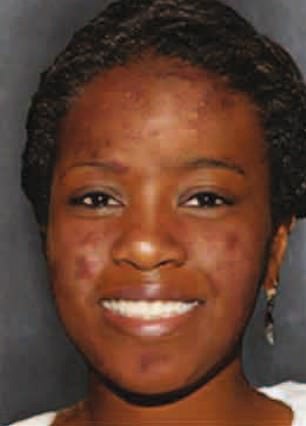People with zits are less likely to be hired, dated or befriended due to ‘acne prejudice’, study finds
A study shows that people with acne are less likely to be hired, dated, or make friends than people with clear skin.
Researchers at Brigham and Women's Hospital in Massachusetts also found that people were less likely to post photos with them online.
For the study, researchers recruited 1,300 people and showed them an image of someone with clear skin, mild or severe acne – before asking them a series of questions.
Researchers said people stigmatize those suffering from acne and urged health insurers to cover treatment for it. Currently, most consider it a “cosmetic problem.”

The above shows a woman's face, shown in the study, with clear skin (left) and severe acne


A man's face shown in the study with clear skin and digitally altered to show severe acne
Acne is the most common skin condition in the US, affecting 50 million Americans every year.
It normally first occurs during puberty and affects adolescents and young adults, causing them to develop small or large red bumps on their skin, pimples and crusty skin bumps.
The condition is caused by the hair follicles becoming clogged with oil or dead skin cells, which can be a result of shifts in hormones such as testosterone, some cosmetic products and certain medications.
Treatment includes a selection of creams and antibiotic tablets and injections, but some patients may be left with the condition for years.
In severe cases, patients may develop scars on the skin that will affect them for the rest of their lives.
In the study, published today in JAMA Dermatologyresearchers digitally altered images of the faces of four adults to show examples of clear skin, mild and severe acne.
Attendees, recruited via social media were then shown one of twelve images and questioned about their response.
They were asked whether they agreed or disagreed with several statements, including “I would feel comfortable if someone like this were in a photo I post on social media,” “I wouldn't mind have close contact with this person' and 'I would feel comfortable being friends with the person in this image'.
Two of the images were of people of color to measure how responses differed when skin color was included.
The participants were predominantly white, female, approximately 42 years old and from a highly educated background.
The results showed that for the image of severe acne, only 25 percent of respondents strongly agreed that they would date the person.
By comparison, among white people, 45 percent strongly agreed that they would date that person.
Just under 60 percent of respondents strongly agreed that they would like to post a photo of someone with acne on their social media, compared to 65 percent of those with clear skin.
When hiring, only 50 percent said they strongly agreed they would hire someone with severe acne, compared to 65 percent of those with clear skin.


The face of a woman with clear skin and with severe acne. Researchers found that participants had more negative reactions to people with dark skin and acne


The above shows the face of a man with clear skin and severe acne
The responses also showed that the majority of participants said they thought people with severe acne were unattractive and had poor hygiene.
Participants also showed a greater desire to socially distance themselves from individuals with acne and dark skin, the researchers found.
A statistical analysis was also performed, adjusting the results for the age, sex, and gender of the study population. This also showed that people were more likely to avoid people with severe acne than people with clear skin.
There was no evidence of a link based on gender, the researchers found, but people were more likely to be hostile toward those with darker skin who also had acne.
Dr. John Barbieri, a dermatologist who led the study, said: 'Our findings show that stigmatizing beliefs about acne can affect quality of life, possibly by affecting personal relationships and employment opportunities.
'Acne is often wrongly seen as purely a cosmetic problem.
'It is important that people with this medical problem have access to treatment, just like any other condition.'
He added: 'Many insurers do a poor job of covering acne and rosacea treatments because they claim it is cosmetic.
'Our study highlights the need to change that narrative and identify approaches to reduce stigmatizing attitudes in the community.'
Limitations of the study included that it primarily included white women, which may not be reflective of the entire population.
